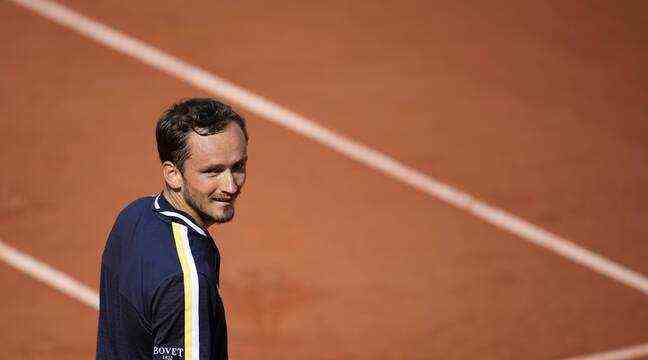Daniil Medvedev finally has fun at Roland Garros. – Christophe Ena / AP / SIPA
- After the historic debacle of the Blues in this Roland, relations between the Federation and the private academies are at the heart of the discussions that animate French tennis on the training of players.
- These structures would like more consideration and better collaboration, which the new federal team seems ready to grant them.
- The example of Daniil Medvedev, fashioned at the Elite Tennis Center in Cannes, constitutes a weighty argument in this debate.
At Roland-Garros,
We are not yet thinking of sending the UN, but the French fiasco in this 2021 edition has further accelerated the need to resolve a conflict dating back more than 30 years. We have been talking about it since last week, the French Tennis Federation, at the dawn of a generational hollow – especially among boys – which announces long winters, must rethink its training system. And find a way to (re) engage in dialogue with private academies, looked down on since the very first ones created by Georges Deniau or Patrice Hagelauer, and apparently not such a bad idea when you see the health of Italian tennis.
There are good players, however, who have come out of it. Small problem, they are mainly foreigners, landed in adolescence for the benefit of leading structures. The best known of them is Daniil Medvedev, world number 2 and who will play a place in the semi-final this Tuesday evening against Stefanos Tsitsipas. “If Daniil had been French, we would only be talking about us! We would have become a benchmark in French tennis ”, regretted
sunday in The team Philippe Rome, the Russian trainer at the Elite Tennis Center of Jean-René Lisnard, based in Cannes.
No more “third knives”?
For one (or more, let’s think big) French Medvedev to emerge in the years to come, the collaboration must be done in an honest way and without ulterior motive. “In French players, we often have the third knives. The first and second are taken by the federation ”, also explained Philippe Rome, who recalled that the invitations were more allocated to young people training at the FFT. And the sponsors encouraged to go to them first.
“Everything is free at the Fédé, adds Lisnard. So sometimes, even if the young people don’t necessarily want to go or stay there, because it doesn’t really match with a coach for example, they will still do it. If we put ourselves in the shoes of the parents, it is one less investment. “
A round table dedicated to the future of French tennis
The new federal team seems to want to put an end to this unfair competition. Or at least rebalance things. “We are ready to put everything back together,” promised Gilles Moretton Thursday at the press conference organized urgently in the presence of all thinking heads. On Sunday, Bernard Giudicelli’s successor gathered around thirty people around a round table devoted to the future of French tennis. On the menu in particular, relations with academies, which Jo-Wilfried Tsonga had dezinced (relations, not academies)
in The team the same morning.
All the heads of private structures were invited. Jean-René Lisnard also, therefore, but taken by the time, he could not move. Which does not prevent him from following all this closely, of course. “They want to collect opinions, which is already a good thing,” he said. Afterwards, it’s like everything, we will see in the acts. I still trust people like Arnaud Clément, whom I know well. “
The vice-president for the high level of the FFT, still classified 0 to 18 years, is well placed to know that there is life outside the federal fold. Paul-Henri Mathieu, recently appointed high level director, also.
“Paulo grew up in the United States [il a passé trois ans à l’International Tennis Academy de Floride], like me, and we then came back and defended the colors of French tennis, notes the trainer from Cannes. I don’t see where it’s complicated to have a dialogue between the Fed and the academies. Tomorrow, if a Frenchman wins the US Open, whether he trained in Italy, in a center in Angoulême, at the CNE or in England with his father, it’s the same. The goal is to see a Frenchman win. “
With Nicolas Escudé, interim DTN, Clément and Mathieu will be responsible for developing a new battle plan. “Our role is going to be to find out exactly what kind of coach a player needs. Our young people need to take charge, be responsible, know why they are training, in what direction, and be the bearers and masters of their project, ”asserts Moretton.
The Medvedev-Cervara example
The understanding with the coach is the basis of everything, is convinced Lisnard. “What makes the difference is two men, a player and a coach, together, H-24,” he says. This is what matters. We can put whatever we want around, it’s a story of meeting and working. Exactly what happened to Daniil Medvedev at home, precisely.
Arrived in the south of France at 17, stammering a few words of French, the already slender – and a little crazy, as he says himself – Russian found in Gilles Cervara the mentor he needed. A former anonymous player who has become an atypical coach whom the FFT would surely never have thought of. He caught Medvedev and never let go, until he was named the best coach of the circuit by the ATP in 2019, the year his foal took off.
Nicolas Escudé confirmed on Sunday the Federation’s desire to leave more latitude to the players to choose their working environment. Everyone agrees on the principle, remains the hardest part, where good intentions have always stopped in recent years: structure this policy and implement it. “It will not be the miracle solution, we must also change mentalities, at all levels. But it would be a good start, ”says Jean-René Lisnard.

